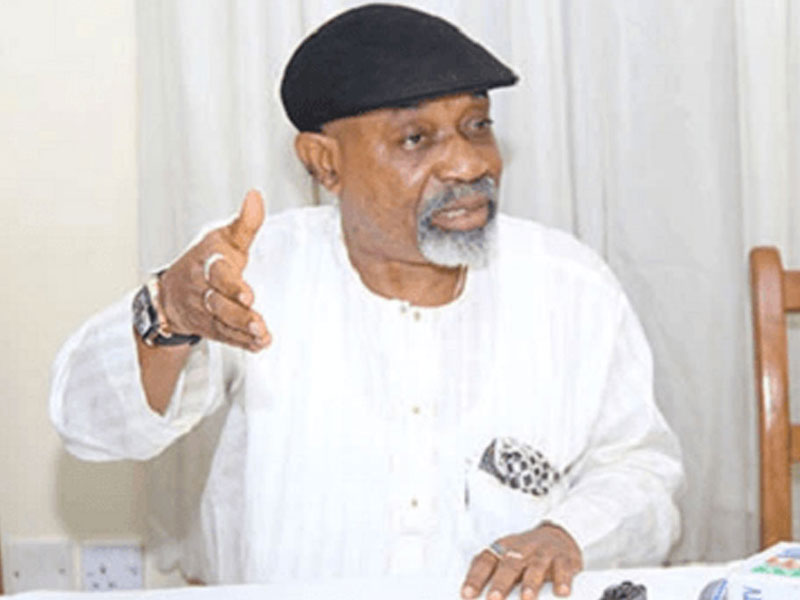The Nigeria Government has called for support from the International Labour Organisation (ILO) to achieve the Sustainable Development Goals (SDGs) by 2030.
The Minister of Labour and Employment, Sen. Chris Ngige, said this at the ongoing 110th session of the International Labour Conference in Geneva, Switzerland on Thursday in Abuja.
Ngige was responding to the report of the Director-General of the ILO, Mr. Guy Ryder.
Ngige, represented by Daju Kachollom, Permanent Secretary in the ministry, said the support was imperative due to the current state of the growing inequality gap.
“We consider that the achievement of the SDGs by 2030 is at great risk."
“If the goal of “not leaving anyone behind” is ever to be realized, urgent effort, support, and contribution will be required by all in a renewed commitment to multilateralism and international cooperation,’’ he said.
He said the report of the Director-General on the Least Developed Countries (LDCs) – Crisis, structural transformation and the Future of Work was appropriate for the debate.
He said that this was in view of the multiple implications of current global challenges.
He said the analysis of the character and challenges of the labor markets index of the 46 LDCs raises some concerns.
According to him, this is especially in the light of the impact and slow recovery progress of many economies after the pandemic.
“ The volume of job losses and the established link between social justice and global peace should provoke honest debate at this conference."
“The wave of insecurity, terrorism, food scarcity, the rising cost of energy, and the impact of COVID-19, among others should challenge our common humanity and shared international relations."
“These are consummate recipes for global socio-economic disruption and widening inequality,’’ he said.
The minister added that the ripple effect of the deteriorating situation in these 45 LDCs was capable of eroding the gains of the developing and developed economies.
“Our response should go beyond statistics and rhetoric to plans which will stimulate economic activities to generate decent jobs for the teeming unemployed youths who yearn for a dignified life,’’ he said.
According to Ngige, Nigeria has over the years upheld the four pillars of the Decent Work Agenda as well as the Strategic Objectives of the ILO.
“This is by implementing different transformative Agenda and Visions to structurally transform and improve its economic productive capacities and outputs."
“This ultimately is a bit to move the country on the path of sustainable development and economic growth,’’ Ngige said.
He noted that currently the Economic Recovery and Growth Plan (EGRP) of 2017 to 2020 is being rolled into National Development Plan 2021-2025.
He said that this takes into cognizance achievements from preceding activities, programs, and projects with well-defined key performance indicators as guides.
“We have entrepreneurial programs and projects in the agricultural sector through various loan schemes that have created volumes of decent jobs."
“We also focused on several intervention programs on social assistance and social protection to ensure the non-erosion of the pre-COVID-19 gains on Social Protection Floors."
“These were to cushion the effect of the emerging global challenges listed in the D-G’s report,’’ he said.
He said if LDCs were to proceed on the legitimate path of structural transformation, it would involve reengineering their productive capacity, recalibrating their institutional arrangement, and reviewing their governance structure to transit to the league of developing countries.
Ngige added that it would require increasing support and projects by international communities and multinational institutions (ILO inclusive) to assist the LDCs in the six key focus areas listed in paragraph 25 of the report.
He said this is in addition to adhering to the principles of country ownership emphasized in the Doha Programme of Action to transition.
“Unfortunately though, the ambitious centenary declaration of 2019 and the 2021 Global Call to Action for a human-centered recovery from the COVID-19 crisis have no direct link to the LDCs."
“We request a review and reiterate our previous call for the need to ensure that COVID-19 vaccines reach the remotest part of the world by granting patent rights for the production of vaccines to regions."
“Sadly too, the LDCs are mostly the regular members of the Committee of Experts on the Application of Standards."
“We advocate a review of this practice especially as it relates to the LDCs' economic performance and development,’’ he added.








